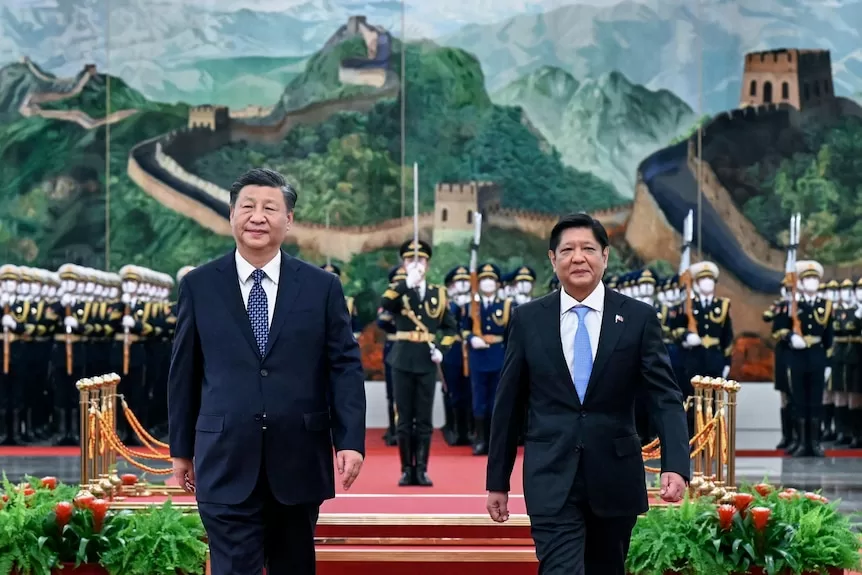Philippine President Ferdinand Marcos Junior says the potential for conflict with China in the South China Sea is increasing and wants Chinese President Xi Jinping to be more responsive.
Speaking to 7.30 on the sidelines of the ASEAN Summit, Mr Marcos said he fears a single incident in the territorial waters could spark a wider conflict.
“The potential for outright conflict is much higher now than it was before,” Mr Marcos told 7.30 of the South China Sea.
“We worry in the Philippines because it could come from, not a strategic decision by anyone saying, ‘OK, we’re going to war,’ but just by some servicemen making a mistake, or some action that’s misunderstood.
“That’s why the ongoing attempt is always to try and lower the temperature down [when] the rhetoric is up.”
Asked how he would do that, Mr Marcos indicated he had opted for a solution that worked for other leaders in the past.
At the height of the Cold War, United States president John F Kennedy and Russian leader Nikita Khrushchev had a direct phone line to use should it be needed, with nuclear tensions at an all-time high.
Mr Marcos said he wanted a similar line with Mr Xi and proposed it in January last year, in Beijing.
“That is what I proposed, a kind of hotline between us so that if there is a message that needed to be sent from one president to another, we can be assured that that message will reach them,” Mr Marcos said.
However, more than a year later, a phone line has not materialised.
Australia can help ‘keep the peace’
The comments came as Australian Foreign Minister Penny Wong also warned of the risk of conflict in the South China Sea and called for a new “preventative architecture” in the face of heightened tensions.
There have been several flashpoints in the South China Sea in recent times that have involved Chinese vessels and maritime incidents involving both Australia and the Philippines.
An Australian ship was involved in a sonar incident in late 2023 and in October military tensions between Manila and Beijing escalated after a Chinese coast guard ship and one of its militia vessels separately bumped a Philippine coast guard ship and a military-run supply boat off a disputed shoal in the South China Sea.
The South China Sea is of great commercial and strategic interest to Australia and regional nations such as Indonesia, Malaysia, Philippines, Vietnam, Taiwan and Brunei but has been almost entirely claimed by China.
China asserts its territorial rights in the South China Sea with a vague, U-shaped “nine-dash line”.
It was first drawn in 1947 and since then China has used a series of legal arguments and its presence in the region to assert its claim.
Asked to explain to Australia’s servicemen and women why they should risk their lives to aid The Philippines if they come under pressure from China, Mr Marcos said doing so would be beneficial to Australia.
“If we can stop [conflict] at an early stage then there is no need for it to grow into other areas, other regions,” he said.
“Hopefully, if we can, at best as I said, keep the peace in the South China Sea, that will be of great advantage to Australia.”
Like father like son?
Dictator Marcos Senior was overthrown in a revolution but Marcos Jr says he himself has no authoritarian impulses.
“I have no impulses to authoritarianism whatsoever,” he said.
“I think we have a good system going.
“I think we’ve learned to have a constitution that we have gone by for the last 36 years now.”
Despite those comments, Mr Marcos says his father had little choice but to rule the Philippines in the manner he did.
“We were fighting two wars and on two fronts,” he said.
“Internally, we had the secessionist movement in the southern Philippines, and we had the communist guerillas in the countryside.
“So there was a necessity because there was war. We have, thankfully, made a great deal of progress in that regard.
“It was a very different sort of authoritarian rule.
“When people think of an authoritarian rule [they think] it was non-participatory.
“Whereas I think the version that my father tried to promote, and actually practised was very much still with the participation of all stakeholders so that were involved. It was just a peace and order situation that really dictated the necessity for the declaration of martial law.”
Watch 7.30, Mondays to Thursdays 7:30pm on ABC iview and ABC TV
Contact 7.30
Do you know more about this story? Get in touch with 7.30 here.
